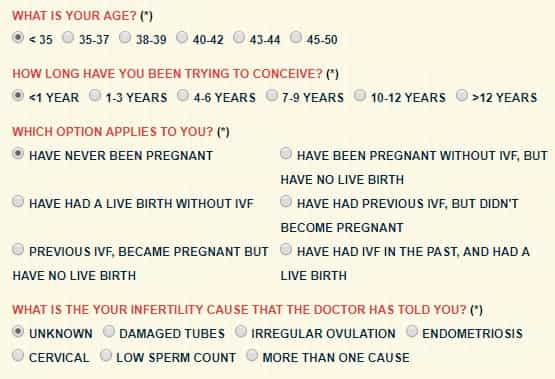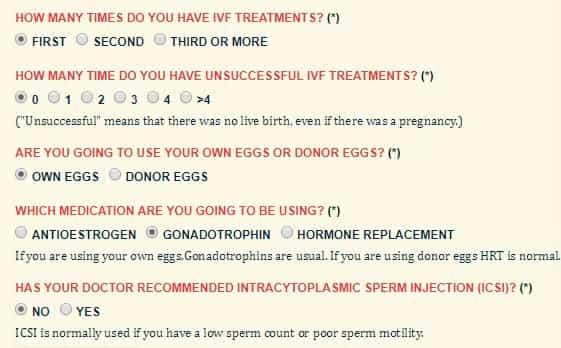Last Updated on December 2, 2020
What is my success rate with IVF? This IVF success calculator helps you understand your chances of having a live birth with your next IVF cycle, based on your personal situation.
For many women and couples, the decision to use IVF as a fertility treatment is difficult. All things considered, IVF treatment is one of the most expensive options out there. Therefore, the decision can’t be made lightly. If an IVF success rate calculator could accurately predict success, would you use it? And could it help make the decision easier?
IVF success depends on many factors. Age, specific infertility issue, and the number of years of infertility before IVF all impact success rates. For example, research shows that age significantly impacts IVF success. However, other factors do, too.
An IVF success rate calculator that’s been tested and found accurate can help women choose between IVF and another option. After all, IVF helps tens of thousands of women become pregnant every year, but it doesn’t work for every woman or situation. Until recently, no free, online IVF success calculator could help women determine – in advance of seeing a doctor – their personal chances of success.
Contents
How to Predict IVF Success Rate
You may be wondering, is it possible to predict IVF success rate? Yes, it is, but no IVF success rate calculator is completely foolproof. Additionally, fertility specialists consider the same basic factors that an IVF success calculator would predict success rate. Of course, the calculator cannot understand or know the individual or the clinic. That information makes a big difference.
For this reason, an IVF success rate calculator predicts the success rate of a group of factors, but not an individual. In fact, two individuals with the same answers could go on to have very different IVF experiences.
Keep in mind that the fertility specialists, their techniques and experience, and clinic processes also impact IVF success rate. At the same time, research has proven the reliability of an IVF success calculator.
How an IVF success rate calculator works
First, accurate and reliable predictions depend on honesty and providing complete answers. An IVF success rate calculator looks at several characteristics of a couple and their IVF treatment choices. Then, using research data, the calculator comes up with a success rate as a percentage.
What’s nice about this kind of calculator is that couples can use it to weigh their options and then make informed decisions. For example, one of the questions the calculator asks is whether or not the woman will be using her own eggs or donor eggs. The answer to that question can increase or decrease the success rate.
At the same time, no one likes to be misled or to receive false encouragement. Therefore, IVF success rate calculators have to be very accurate and endorsed by medical professionals and/or scientists. Furthermore, a good calculator is based on reliable data from many couples who’ve gone through IVF.
Consequently, IVF success calculators should be reliable, accurate, and based on data. Additionally, anyone using an IVF success rate calculator should still consult with a fertility specialist. Then, the specialist can talk about the things the calculator may miss.
Predicting success rate using an IVF success calculator
First of all, an IVF success rate calculator should provide you with a reliable measure of how likely it is that you’ll have a live birth using IVF. You can, of course, use your real life, current situation. On the other hand, you can play with a variety of scenarios to see if the success rate changes.
The likelihood of IVF success increases or decreases depending on how you answer questions in the IVF success rate calculator. For example, consider a 40-year-old woman with endometriosis who’s been trying to get pregnant for 5 years, has never had a live birth, and has never used IVF before. Based on these factors and a few others, her IVF success rate is 33.1% using donor eggs.
But using fresh eggs, the result in the IVF success rate calculator drops to 10.8%. Still, that scenario should give you some indication of how much fresh eggs vs donor eggs changes the IVF success rate in a 40-year-old woman.
Consider another example. For a 28-year-old woman with the same answers to the other questions, the rate of IVF success using fresh eggs is 28.4%. However, using donor eggs, the rate is only slightly higher, at 31.3%. Given that, you can see how much age plays an IVF success rate with fresh eggs.
How to use this IVF success calculator
By and large, This is considered an accurate, reliable IVF success rate calculator. The calculator walks you through a series of questions about important things that will impact IVF success, starting with age.
The IVF success rate calculator then collects all of the data and comes up with a success rate. You can also change some of the answers to see what happens to the success rate. Doing so will help you come up with a range of success, based on certain situations. It may also be helpful to know the rate of success using donor eggs vs fresh eggs, or the rate of success today vs one year from now.
Please note that the IVF success calculator predicts the likelihood of live birth, not pregnancy alone. It also assumes up to six IVF rounds, not just one. In other words, if you only plan to try one round of IVF, the calculator may not be right for you but it could give some insight.
Here’s how to use the IVF success rate calculator.

Step 1: Enter the woman’s age.
The IVF success rate calculator relies heavily on the woman’s birth because research has shown that age is a primary factor.
Step 2: Choose the number of years you’ve been trying
Here, tell the calculator how many years you have been trying to conceive and have a live birth. The answers range from “Less than 1 year” to “More than 12 years.”
Step 3: Select your pregnancy history
This question asks about IVF, pregnancy, and live birth history in the IVF success rate calculator. After the questions about IVF attempts, you’ll choose from six different scenarios: No IVF, no pregnancy, No IVF, pregnancies only, No IVF, live birth, IVF no pregnancy, IVF pregnancies only, and IVF, live birth.
Step 4. Select the cause of infertility
Choose “Unknown” if you’re not sure, or if your fertility specialist has said the cause is Unknown. The answer can increase or decrease the results, so try and be as accurate as possible.

Step 5: Select the number of IVF attempts
Will this be your first, second, or third or more attempt at IVF treatment? Select the answer. There is some research to show that IVF chances of success decrease with subsequent attempts. Try using the IVF success calculator three times – each with a different answer here – and see if and how your results change.
Step 6: Select the number of unsuccessful IVF attempts
Similarly to the field above, you’ll need to choose an answer here. You can choose between Zero, One, Two, Three, Four, and Five or More.
Step 7: Choose the type of eggs used
Like age, the type of eggs used – donor vs own eggs – changes the success rate dramatically. Select either Own Eggs or Donor Eggs in the IVF success rate calculator. You can go back later and change your answer to see if anything changes.
Step 8: Medication
The type of medication used for IVF treatment has some impact on success rates in the IVF success calculator. The calculator does provide some guidance here. You choose one of three medications: Antioestrogen, Gonadotrophin, and Hormone Replacement.
According to the IVF success rate calculator, you should select Gonadotrophin if you are using your own eggs and Hormone Replacement if you are using donor eggs. However, if you are using Clomid or are going to be using Clomid, select Antioestrogen. The reason is that Clomid has anti-estrogen properties.
However, if you’ll be working with a specific clinic, learn which medication they will treat you with. Some clinics always start with something like Clomid, while others only ever use Gonadotrophin.
Final Step: Choose ICSI Response
The final question in the IVF success rate calculator is about ICSI. The calculator asks you whether or not a doctor has recommended ICSI. ICSI is sometimes recommended when the sperm count or motility is low. With ICSI, fertility specialists directly inject a sperm into an egg to encourage fertilization.
Example Results from the IVF Success Rate Calculator
Below are 3 potential scenarios to show you how the calculator responds to certain information. Every patient is different, so predictions of IVF given are approximate. The data on this IVF success calculator is not intended to be a substitute for professional medical diagnosis or advice.
Scenario A
| Woman’s Age | 35 |
| Trying for | Less than 1 year |
| Pregnancy history | No IVF, live birth |
| Cause | Unknown |
| IVF Attempts | First |
| Unsuccessful IVF Attempts | Zero |
| Own or donor eggs? | Own eggs |
| Medication | Antioestrogen |
| Will ICSI be used? | No |
| IVF success rate calculator result: | |
| Chance of a live birth | 30.3% |
Scenario B
| Woman’s Age | 41 |
| Trying for | 6 years |
| Pregnancy history | IVF, pregnant only |
| Cause | Endometriosis |
| IVF Attempts | Third or more |
| Unsuccessful IVF Attempts | Four |
| Own or donor eggs? | Donor eggs |
| Medication | Hormone replacement |
| Will ICSI be used? | No |
| IVF success rate calculator result: | |
| Chance of a live birth | 20.6% |
Scenario C
| Woman’s Age | 28 |
| Trying for | 3 years |
| Pregnancy history | IVF, no pregnancy |
| Cause | Irregular ovulation |
| IVF Attempts | Second |
| Unsuccessful IVF Attempts | One |
| Own or donor eggs? | Own eggs |
| Medication | Gonadotrophin |
| Will ICSI be used? | No |
| IVF success rate calculator result: | |
| Chance of a live birth | 23.8% |
Frequently Asked Questions – IVF Success Rate Calculator
How does an IVF success rate calculator work?
- An IVF success rate calculator uses answers to questions about age, infertility history, IVF history, and potential IVF treatment scenarios. The calculator uses that information to predict the likelihood of live birth after an IVF attempt.
What information do you need to use an IVF success rate calculator?
- You need to provide information about the woman’s age. You also need to know the infertility cause and history, any previous IVF treatments, and the type of medication to be used. Lastly, you’ll answer a question about ICSI.
Can you use hypothetical numbers in an IVF success rate calculator?
- Yes, you can definitely use hypothetical numbers. Use the IVF success rate calculator to test different scenarios and get a variety of outcomes.
Read More:
- What Is IVF Success Rate? Important Things To Consider
- IVF Success Rates Over 40 with Own Eggs and Donor Eggs